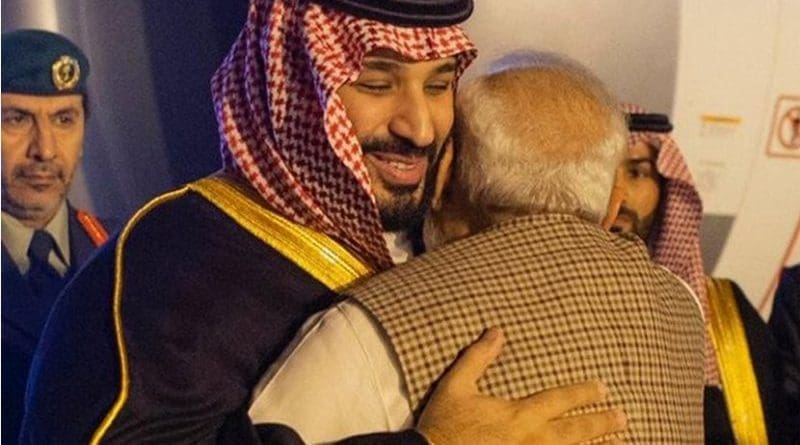Modi’s Middle East Deals Snub Iran – Analysis
By Observer Research Foundation
India’s newly aggressive strategy puts Gulf money and Israeli weapons first.
By Harsh V. Pant and Hasan Alhasan*
Indian Prime Minister Narendra Modi is finally doing something about his country’s sluggish approach to the Middle East. Over the past five years, he has pushed an aggressive strategy of partnering with Saudi Arabia, the United Arab Emirates, and Israel in a bid to attract investments and forge deeper security partnerships. In doing so, he has largely ignored Iran and broken with India’s Cold War-era legacy in the region.
Since his election in 2014, Modi has made foreign policy a priority, prompting some observers to claim that a “Modi doctrine” is now in effect. The Middle East is no exception. Despite the complexity of governing a country the size of India and navigating its dizzying domestic politics, Modi has visited eight Middle Eastern countries and territories since 2014, more than his four predecessors combined.
As so often is the case in the Middle East, the big driver is oil. India is likely to overtake China as the top driver of growth in oil demand by 2024. During his maiden trip to New Delhi in February, Saudi Crown Prince Mohammed bin Salman said that he saw over $100 billion worth of investment opportunities in India over the next two years, although details of these investments have yet to be revealed. India has also shored up its energy investments in the region. India’s state-owned oil company ONGC Videsh has acquired a 10 percent stake in an offshore oil concession in Abu Dhabi for $600 million.
The new interest comes against a background of historical indifference. Despite large volumes of trade and a massive presence of Indian expatriates in the Arab monarchies of the Gulf, cross-border investments between the Gulf monarchies and India have remained low for decades. Although 8 million Indians live in the Gulf states, remitting around $53 billion (as of 2015) back home each year, investments have remained negligible. India and the Gulf monarchies still do not appear among each other’s top 10 sources of foreign investments.
With Modi in office, however, things seem to be changing. Over the past four years, he has built close bonds with young Gulf leaders, including with the crown princes of Abu Dhabi and Saudi Arabia. Mohammed bin Salman reportedly referred to Modi during his visit to New Delhi as his “elder brother.”
As a result, investments from the Gulf in India’s energy sector have begun to materialize in recent years despite lower oil prices. In October 2018, Dubai’s DP World won a $78 million concession to develop a warehousing zone in India’s largest container port, in Mumbai. Moreover, Saudi Aramco and the Abu Dhabi National Oil Company have agreed to invest over $44 billion in India’s massive Ratnagiri oil refinery in Maharashtra, although the project has faced delays. In May 2018, the Saudi petrochemicals giant Saudi Basic Industries Corp. was also reported to be considering a 50 percent stake in a $4.6 billion petrochemicals plant in the Indian state of Gujarat, Modi’s home constituency.
For Modi, however, the Middle East is not just about business deals and investments, as security also ranks high on the agenda. India has eyed Israel as a source of sophisticated military technology, topping the list its defense clients at over 40 percent of Israeli military exports between 2012 and 2016. Recent Indian acquisitions include 54 attack drones, the Barak-8 maritime long-range surface-to-air missile system worth over $6 billion in total, and a medium-range surface-to-air missile system for $2 billion.
India is also showing signs of finally overcoming its reluctance to forge security partnerships with the Gulf states whose security apparatuses had long been closely associated with Pakistan. Such efforts seem to be paying off. In 2018, the UAE extradited three individuals wanted in India on corruption charges, a move that the Indian ambassador in Abu Dhabi attributed to a “personal touch,” an obvious if implicit reference to Modi’s warm ties with leaders in the UAE. In 2018, India signed a pact with Oman that allows the Indian Navy to use the strategic port of Duqm overlooking the Arabian Sea and the Indian Ocean.
Security cooperation was also a key focus of Mohammed bin Salman’s visit to New Delhi last month, when the two sides agreed to cooperate in producing “spare parts for naval and land systems.” In a statement, Saudi Arabia promised to share more intelligence to boost counterterrorism cooperation with India, a powerful message considering the India-Pakistan confrontation over a militant attack last month that left 40 Indian paramilitary troops dead in Kashmir. And the UAE is reported to have played an important role in defusing these tensions.
But there’s one big exception to Modi’s love fest with the Gulf: Iran. Although India’s relations with the Islamic Republic may not have worsened, they pale by comparison with the thrust of its ties to Israel or the Gulf monarchies in recent years. As a result, India seems to be breaking with its “balancing” approach to the region, often considered a legacy of its Cold War-era policy of nonalignment.
Two factors explain Modi’s dampened enthusiasm for close ties with Iran. The first is the reinstatement of U.S. sanctions against Iran by President Donald Trump in November 2018. Although India’s External Affairs Minister Sushma Swaraj reacted to the decision by saying that India did not recognize “any country-specific sanctions,” the threat of secondary sanctions is likely to dissuade most Indian firms from casting their lot with Iran.
This commentary originally appeared in Foreign Policy.

